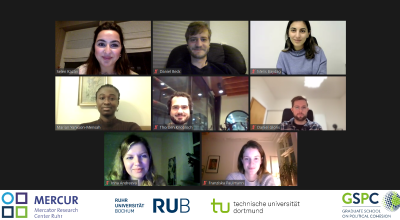Colloquium: Ghanaian Truth and Reconciliation Commission and Political Cohesion
 In our colloquium on December 15th, 2021, Dr. Marian Yankson-Mensah held a talk on whether the Ghanaian Truth and Reconciliation Commission was able to strengthen political cohesion in Ghana, based on her dissertation and extensive fieldwork.
In our colloquium on December 15th, 2021, Dr. Marian Yankson-Mensah held a talk on whether the Ghanaian Truth and Reconciliation Commission was able to strengthen political cohesion in Ghana, based on her dissertation and extensive fieldwork.
Marian introduced us to the complicated younger history of Ghana and the dynamics of transitional justice in conflicted democracies. There have been several coup d’états after the British colonial rule and four resulting constitutions from 1957-1992. Despite its transition to a democratic system due to external pressure in 1992, the Ghanaian society remained to be highly polarized politically. A culture of silence about the human rights violations that occurred under the rule of Jerry Rawlings established itself in accordance with the secretive nature of the transitional process, which mostly occurred in absence of public consultation or a parliamentary opposition force, signifying the need for a Truth and Reconciliation Commission (TRC). Due to the multifarious nature of societal processes, it is hard to establish direct causality between the relative peace in Ghana since 1992 and the work of the TRC, but reconciliation is a long-term goal. Marian holds that currently, there is peaceful coexistence between the different societal groups in Ghana, which also resulted from the sharing of truth and admission of human rights violations in the past through the TRC process. While substantial changes and the implementation of the TRC’s recommendations are still scarce, it did manage to lay the basis – and that is a good starting point.
Thank you again, Marian, for accepting Selen Kazan’s invitation and sharing your experience!
